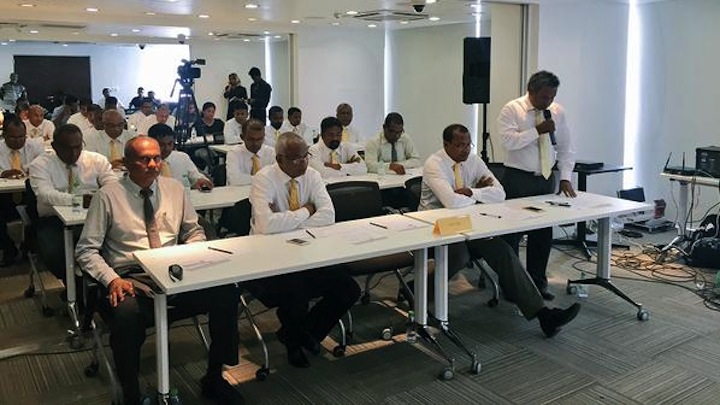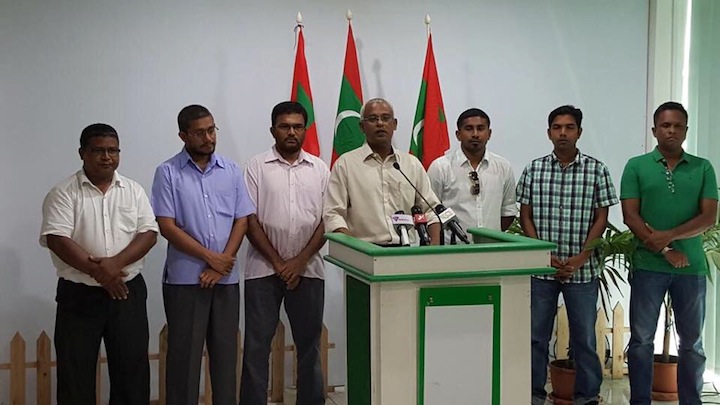The Maldivian Democratic Party (MDP) has proposed imprisoned former President Mohamed Nasheed, chairperson Ali Waheed and MP Ibrahim “Ibu” Mohamed Solih as representatives for talks with the government.
The main opposition party’s national council adopted a resolution today to accept the government’s calls for dialogue to resolve the ongoing political crisis.
“The [MDP] believes that the anxiety and distress in the country can be resolved by all the opposition parties sitting down at the table for discussions with the government,” reads the resolution.
MDP Resolution on Govt-proposed talks: 1)Welcome talks 2)MDP team will be: a- Pres Nasheed b- Ali Waheed c- Ibu Solih pic.twitter.com/587qyq8Mkh
— Eva Abdulla (@evattey) May 24, 2015
President Abdulla Yameen’s proposed agenda for talks focuses on three aspects: political reconciliation, strengthening the judiciary and legal system and political party participation in economic and social development
However, the government has ruled out negotiations over the release Nasheed and former defence minister Mohamed Nazim, insisting the president does not have the constitutional authority to release convicts before the appeal process is exhausted.
President’s office spokesperson Ibrahim Muaz was not responding to calls at the time of publication.
However, Muaz told Haveeru before the resolution was passed that the government will go ahead with the talks even if the MDP declines the president’s offer.
During the national council debate on the resolution, MP Eva Abdulla stressed the importance of talks involving all political parties, including the ruling Progressive Party of Maldives (PPM).
“MDP is the first party that called to solve the political crisis. So we are happy the government took the initiative to hold talks and we accept it. But we want to hold the discussions together, not separately as the government has suggested,” she said.
President Yameen had sent invitations to the three allied opposition parties separately and assigned two ministerial teams for the talks.
Eva also argued that the agenda for the talks should be up for discussion.
“We are not going to discussions to talk only about what the government wants. The discussions will include what the government wants, but also what we want. The agenda of the talks also should be set at the discussions,” she said.
Eva also suggested MDP should not join the discussions without the proposed delegation: “I don’t think there is anything we can solve without the delegation MDP proposed.”
Nasheed is currently serving a 13-year jail term at the high-security Maafushi prison following his conviction on terrorism charges in March.
The MDP has maintained that the trial was a politically motivated attempt to bar the party’s president and presumptive candidate from the 2018 presidential election.
Foreign governments and international bodies including the UN have criticized the trial for apparent lack of due process, while the EU parliament has called for Nasheed’s immediate release.
MDP chairperson Ali Waheed was meanwhile released from police custody this afternoon. He had been held in remand detention since his arrest in the wake of the mass anti-government demonstration on May 1.
Police have concluded an investigation on charges of inciting violence and forwarded a case against Waheed to the prosecutor general’s office. A seven-day extension of detention granted by the criminal court expired today.
While the Jumhooree Party (JP) has accepted the invitation for talks, the religious conservative Adhaalath Party proposed its detained president, Sheikh Imran Abdulla, among the party’s representatives.
Imran was also arrested on May 1 and remains in police custody.
Speaking at today’s emergency meeting of the national council, MP Ibu, MDP parliamentary group leader, noted that the acceptance of the government’s invitation does not mean the party trusts the government.
“We are going to sit down with the government not necessarily because we trust them. We should always learn from what has happened in the past. Recently we saw the Ukrainian government sitting down for talks with Russia despite the distrust,” he said.
Ibu said the planned mass protest for June 12 – organised by the MDP – is also a call for discussions.
“The June 12 protest is also a symbol of negotiations and talks. So I call on the people of Maldives who support our cause to come and join us in discussions,” he said.
Other members of the national council questioned the “sincerity” of the government’s invitation for talks.
“The deputy leader of JP, Ameen Ibrahim, was set free by the High Court but the state once again appealed his case in the apex court to detain him again. So the intent of the government is questionable,” said MP Rozaina Adam.
Ameen is among the five-member team to represent the Jumhooree Party. Some opposition politicians contend the police’s attempt to detain Ameen is an attempt to prevent him from representing the JP.
The resolution was passed with the support of of 42 members with one vote against.
The dissenting member objected referring to Nasheed as the party’s president, arguing that the government might reject the resolution on the grounds that he no longer holds the post.
In late April, the pro-government majority voted through amendments to the Prison and Parole Act that prohibited inmates from holding high-level posts in political parties.
The revised law effectively stripped Nasheed of the MDP presidency.

